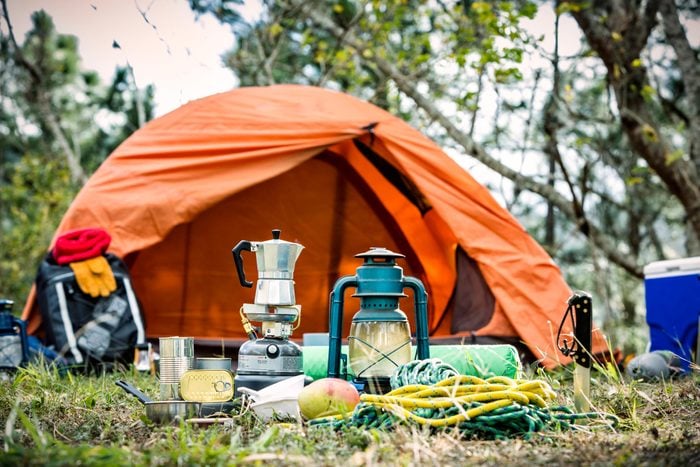
What you really need to know before heading to a campsite
Hot dog buns. It sounds funny, but when people ask me what they need to pack for camping, that’s one of the first things I always say—because they are consistently one of the most common items my campers forget. Everyone remembers the hot dogs for roasting, but not the buns for putting them in. As a result, we end up selling an unbelievable amount of hot dog buns at our camp store during camping season! But that’s just one of the common camping mistakes I see—and one of the camping tips I’ve learned over the years.
I didn’t grow up as a camper. In fact, it wasn’t until I met my now-husband, Alan, in college that I decided to even try sleeping anywhere that wasn’t a bed. But as I fell in love with him, I also fell in love with the great outdoors, and in 2019, we purchased a KOA campsite in Brattleboro, Vermont, that we own and manage together nine months out of the year. To accommodate every level and style of camper, we have camper cabins, campsites for tent camping and spots for RV camping. So believe me when I say I’ve seen it all and learned a lot along the way, including the rude habits other campers dislike.
Whether you’re a camping newbie looking to get started or a veteran camper in search of new camping hacks, you’re about to learn something here. And it will make your next camping trip so much better.
Get Reader’s Digest’s Read Up newsletter for more travel, tech, humor, cleaning and fun facts all week long.
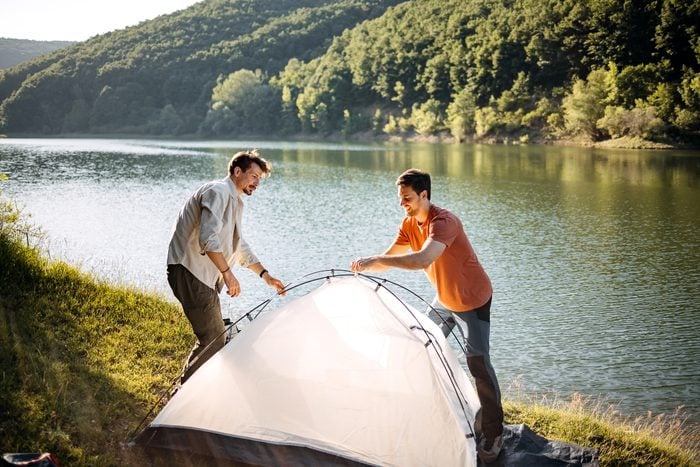
Not doing a “shakedown trip”
A shakedown trip is a dry run of your camping trip, with all your equipment but close to home. This way, you can test out everything, see if you’re missing any items and—most important—make sure you know how to put up your tent. I’ve seen too many campers show up with brand-new camping gear and equipment still in the box and have absolutely no idea how to use it. I’ve also seen seasoned campers who’ve forgotten the tent stakes because they haven’t checked the bag since the previous season.
Do this instead: Do a practice run with all your equipment, set everything up, turn it all on and off, and make sure it’s all in good condition. Yes, it will take an extra couple of hours, but it’s better to spend the time before you leave rather than scramble once you get to the campsite because your camp stove is broken. This is one of the best camping tips you’ll ever learn.
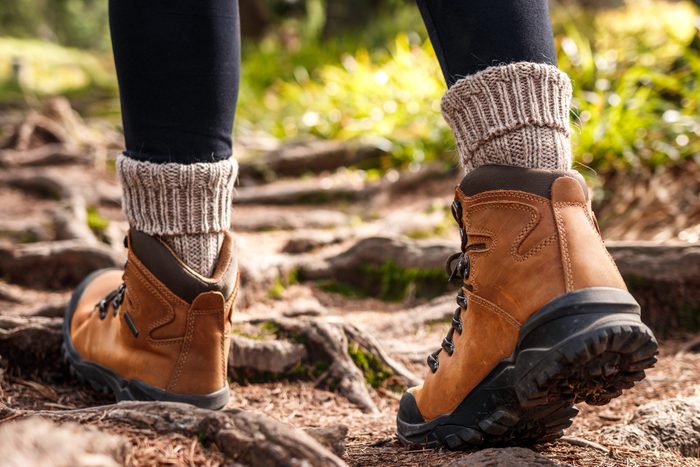
Walking through occupied campsites
Want to start a fight with a stranger? The fastest way to make an enemy while camping is to cut through another person’s campsite. When you pay for a site, it is reserved just for your use, and it’s reasonable to expect others to treat it as your property for that period of time. It’s also a safety issue: Wandering through unfamiliar campsites can lead to tripping over an invisible guy line (those cords that extend from a tent to stakes in the ground) or getting bitten by a dog.
Do this instead: Always stick to the official trails. We make sure that there are clearly marked paths to each campsite, so there’s no need for shortcuts. This is also time to remind you to stick to official hiking trails too, though for different reasons.
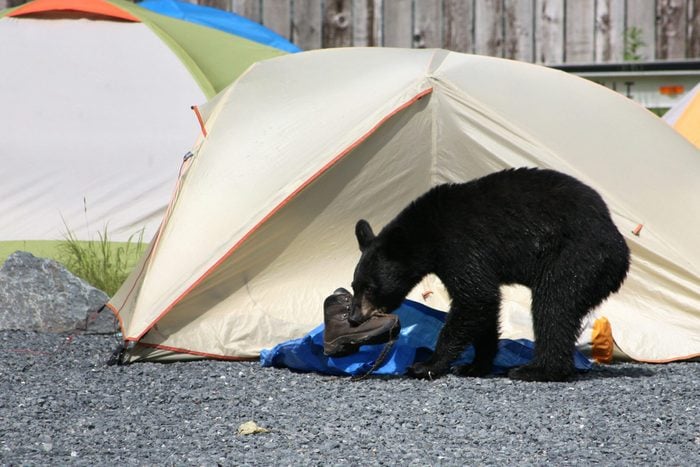
Leaving food or deodorant in your tent
There are bears near our campsite, but even if large mammals aren’t a concern, raccoons, opossums, mice and other critters love a free feast—and your tent wall is not going to stop them from pigging out. Fun fact: Animals don’t generally differentiate between chips-as-food and toothpaste-as-food. Anything scented can draw their attention, and that’s especially true of bears. By the way, here’s what to do if you see a bear.
Do this instead: If you’re camping in an area with bears, it’s important to follow all campsite rules for storing food and hygiene items. This usually means storing them high up in a tree in a “bear bag” or on the ground in a “bear box,” as bears have been known to break into cars too. Otherwise, make sure all food is packaged and put away in your car. Don’t leave food unattended out on tables or in your tent or pack.
What should you do with your garbage? Most campsites have critter-proof garbage cans, so make sure to dispose of your trash in the proper receptacles. (It may mean driving your garbage to the designated disposal area.) Some campsites require you to pack out your own garbage, however, so ask the camp host when you arrive, or check the website for the specific guidelines.
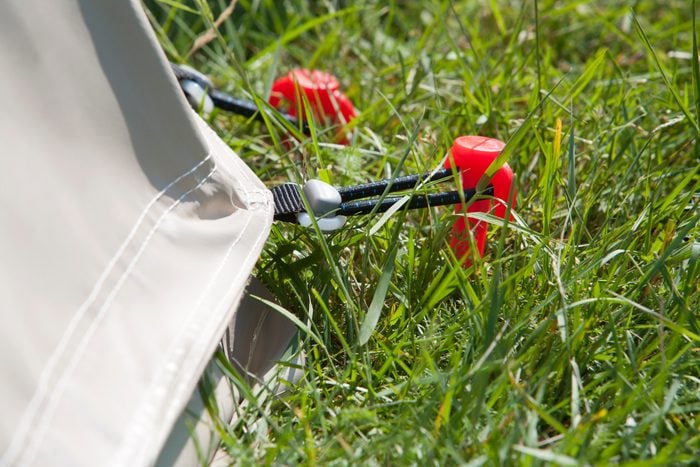
Using plastic tent stakes
First things first: Remember to pack your tent stakes! They’re usually stored in a separate bag from the tent, so they’re easy to forget, and not having them will make putting up your tent nearly impossible. That said, it may be worth upgrading your tent stakes if the ones that came with your tent are plastic. The point of staking your tent down is to keep it stable in storms, and plastic breaks and bends easily.
Do this instead: At the very least, check to make sure all your tent stakes are accounted for and not broken. To be really safe, buy metal tent stakes. (You can find them at any camping store or online.) Pro camping tip: Don’t forget a small rubber mallet to pound them into the ground with. A rock is a surefire way to bend the stake and smash your toe.
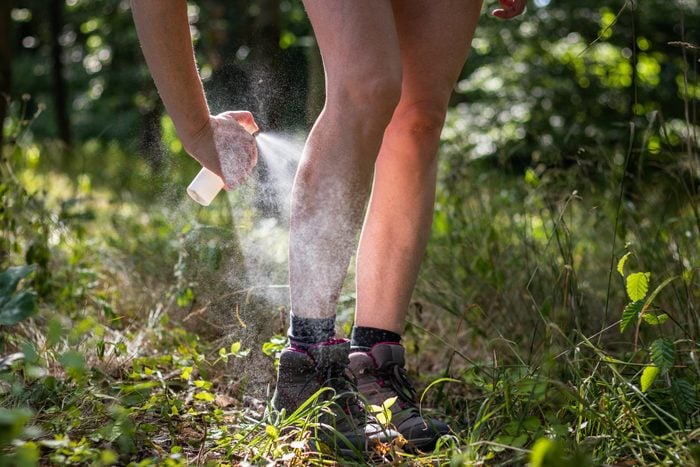
Not bringing enough bug spray
The outdoors are full of bite-y bugs, and your best defense against ticks, mosquitoes, chiggers and other pests is a bug spray with DEET. While most campers do remember to bring one can, they often underestimate how much bug spray they’ll need. Same goes for sunscreen—the more time you are spending outdoors, the more sunscreen you will go through, and a family can easily go through a whole bottle in one day at the lake.
Do this instead: I recommend bringing at least a couple cans of bug spray if you’re staying for a weekend, and more for longer stays or larger groups. It’s also a good idea to bring at least one backup bottle of sunscreen. Don’t stress, though—if you run out, most campsite stores carry them. Just know they will be more expensive.
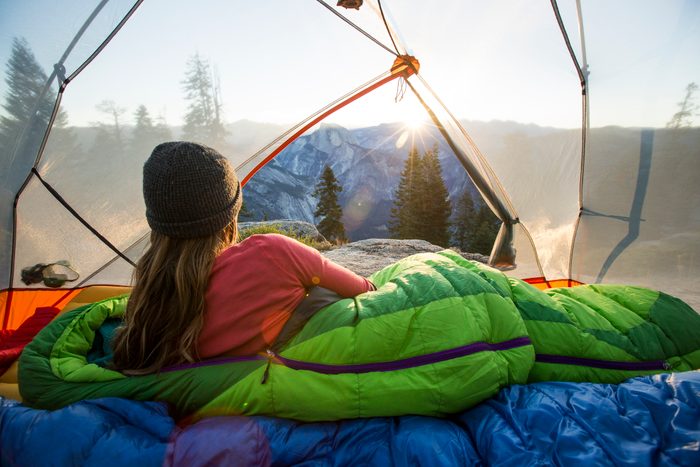
Underestimating the weather
Of course you know that there are no air conditioners or heaters in the wilderness, but most of us are so used to central air that we underestimate how much the temperature swings and what that feels like. For instance, in June, it’s not uncommon for our campsite to be near 80 degrees in the daytime and 40 degrees at night. Not understanding this means too many campers end up shivering in the evening. Weather also often changes quickly, going from warm and sunny to thunderstorms in minutes.
Do this instead: Make sure your sleeping bag is rated for the climate you will be camping in. Check the website a few days in advance for the weather report. And pack at least one warm jacket or coat, a hat, a rain jacket or umbrella, and a rain fly for your tent.
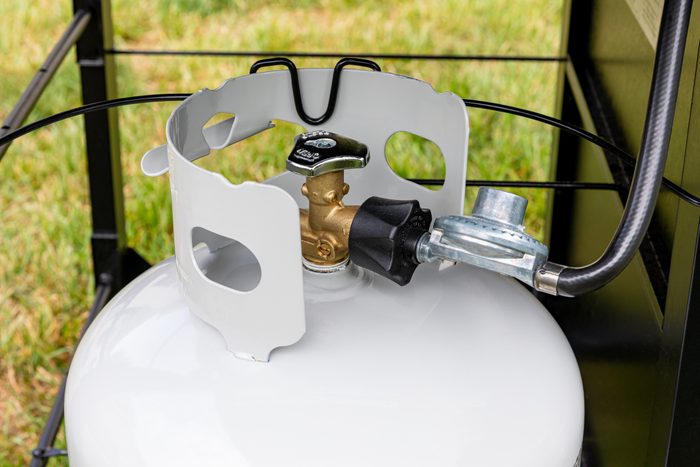
Forgetting propane
Two common mistakes made by people in all types of RVs? Forgetting to refill their propane tanks or not bringing enough propane. Propane isn’t just used for cooking, after all—you’ll need it for heating water and for heating and cooling the RV too. Tent campers should also bring smaller propane bottles that work with their camp stove.
Do this instead: Check the propane tank level before you leave, and get it refilled if necessary. For camp stoves, bring an extra propane bottle. If you run out, your camp host will be able to tell you a spot nearby to fill up.
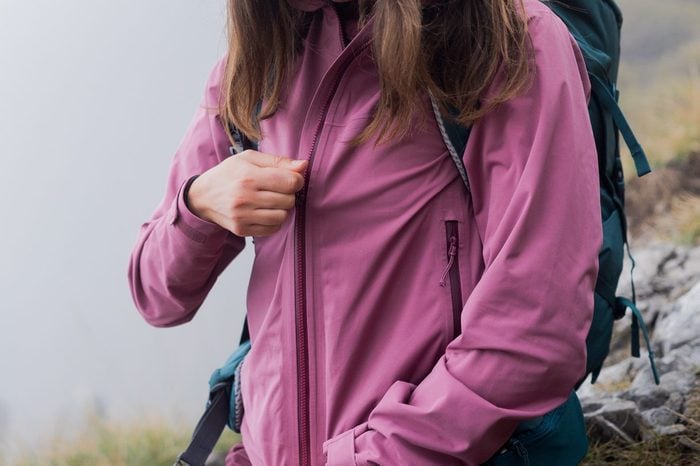
Not dressing in layers
Even if it’s sunny and warm your entire trip, you’ll likely need more than a T-shirt and shorts to be comfy and safe. Yet we see too many campers show up with nothing but clothing for the beach. Bringing some different options will help you adjust to the temperature—plus, dressing in layers is one of the best ways to protect yourself against the sun on very hot days. It can also help you avoid scrapes, bug bites and other outdoor hazards. To be comfy, you’ll want to start out in the cool of the morning with pants and a sweatshirt. You’ll find yourself shedding layers throughout the day and then adding them back on when the sun sets.
Do this instead: Pack at least one pair of durable pants, a long-sleeve top, a warm jacket or sweater, a sun hat and a swimsuit so you can be prepared for anything throughout the day. While we’re on the topic of clothing, don’t forget to bring hiking boots and socks.
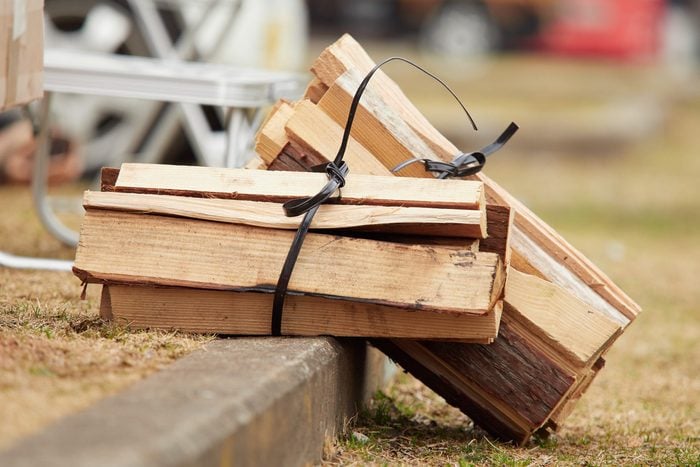
Traveling with firewood
You may want to bring your own wood to burn in the campfire—perhaps you have extra wood lying around the garage, or you know a place to get it for free—but this is a bad idea. First, many woods used in construction are treated with chemicals that become toxic when burned. Second, it’s illegal in most places. Due to invasive insect species that travel in wood and kill trees, most states now have laws that prohibit bringing firewood across state lines.
Do this instead: Plan to buy your firewood from the camp host on site or from a local gas station or camp store. All firewood should be kiln-dried to make sure it’s bug-free—not to mention, it will burn better.

Improperly storing perishable food
Camp meals can be one of the best parts of camping. There’s just something about being outdoors that makes everything taste ah-mazing—but not if you end up with food poisoning. There are no fridges at most campsites (not even for the rangers, so don’t ask), and RV fridges can be less than reliable. This means if you’re bringing meat (including lunch meat), seafood, milk, yogurt or other perishable items, you’ll need to be extra cautious about food safety.
Do this instead: Check to make sure your RV fridge is in good working order before leaving home. Bring a food-grade cooler and enough ice to keep it cold. If you’re staying more than a day or two, you’ll need to buy more ice to restock the cooler. Check at the campsite store or local gas stations.
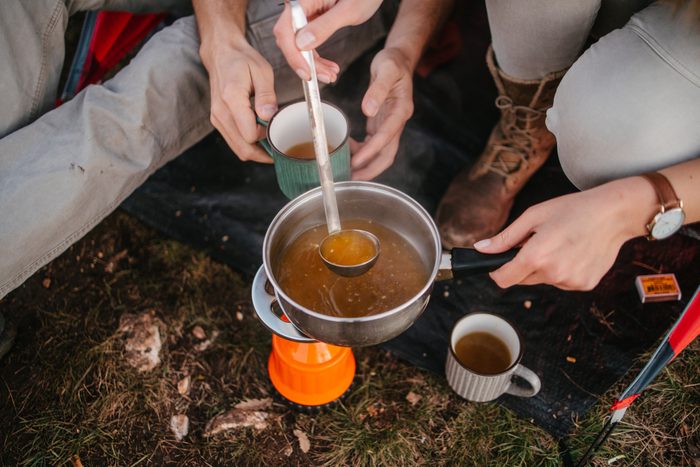
Forgetting basic cooking staples
Salt and pepper can make a huge difference in the flavor of your food, but while these staples are close at hand at home, many people forget to pack spices and seasonings for camping. Same goes for cooking oils and utensils such as knives, cutting boards, napkins, measuring cups and spatulas.
Do this instead: Buy a separate set of salt and pepper shakers to keep with your camping supplies. If you camp often, buy a separate set of camp dishes, pots and utensils that you keep with your gear. This is one of the camping tips that will make your life so much easier. For people who only do the occasional trip, have a master checklist that you can print out and go through before every trip. (While you’re at it, include a small broom, dish soap and sanitizing wipes.)
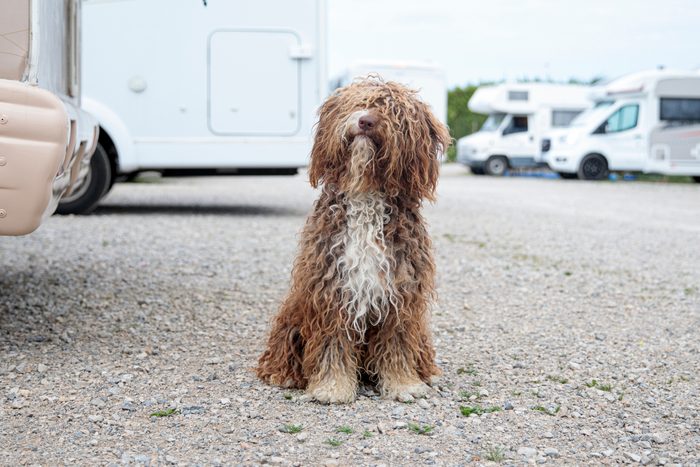
Letting your dog roam free
Camping with pets? Bringing a furry friend can add a lot of fun to your trip. Things feel more free outdoors, and they generally are, so it makes sense that you’d want to give your pet a wider range to roam. Lots of people want to let their dogs off-leash while hiking or at their campsite, but I cannot warn against this enough! This is a recipe for a lost dog, a dog bite or (tragically) a mauled dog. Wandering dogs can also get into fights, make a mess by pooping on trails or eat unattended food that could be bad for them.
Do this instead: Keep your dog on a leash or tie-out that keeps them within the range of your campsite at all times. Bring extra food and water, since they’ll be working extra hard to regulate their body temperature as well. And whatever you do, never leave a dog or other pet unattended at your campsite.
Plus: These dog camping gear essentials might come in handy.
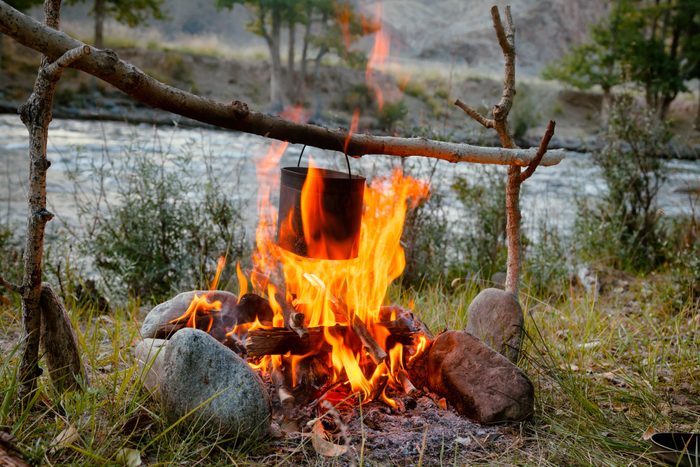
Planning on a campfire
What’s camping without a warm, crackling campfire? Unfortunately, with droughts continuing in many parts of the country, this beloved tradition isn’t always safe, and many campsites are under a burn ban. There are different levels of burn bans with different restrictions—for instance, you may be able to use a lit stove to cook your food but not have a fire.
Do this instead: Check with the camp host upon arrival or check the website a few days before your trip to make sure you’re up to date on any fire restrictions in your area. Then follow the rules to the letter, even if it means your campfire stories are a little chillier than normal!
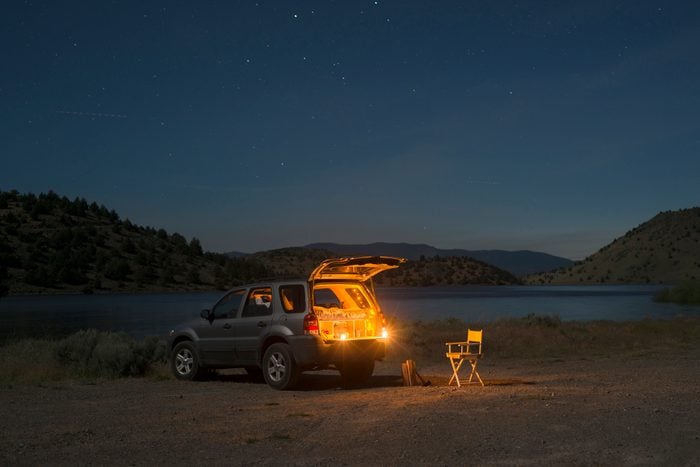
Arriving after dusk
It’s easy to get a late start, and travel plans can change unexpectedly, but these things have more consequences when you’re camping. Arriving close to dusk or after dark will make it really difficult to set up your campsite. Thinking about using your car to shed some light? One of the top annoyances reported by campers is someone else’s car headlights beaming directly into their tent.
Do this instead: Plan ahead so you arrive with plenty of daylight to get your site set up. It can be done in the dark, but if you can avoid it, you’ll be glad you did! If setting up your own campsite sounds too tedious, you can always check out luxury camping. You’ll still want to follow these camping tips, of course, but certain aspects of your experience will be easier, not to mention a little less rustic.
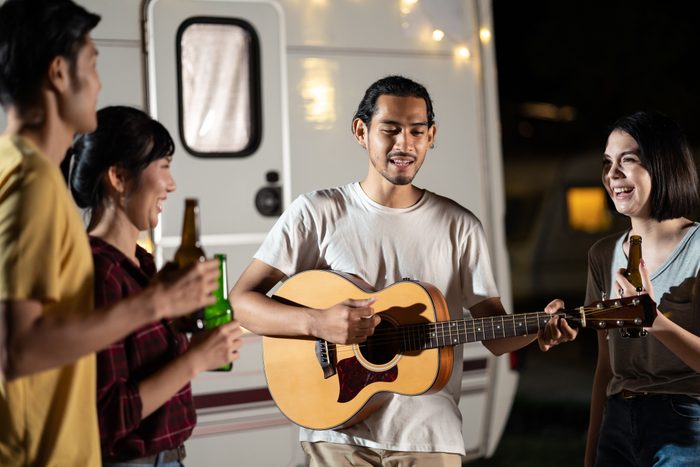
Being noisy during quiet hours
Most campsites have rules, including when you’re allowed to play music from speakers, sing or talk loudly. Sure, you might enjoy dancing, laughing and singing campfire songs till the wee hours of the morning, but your neighbors with a baby may not, and noise carries easily through thin tent or RV walls.
Do this instead: Know the campsite rules, and follow them. Generally, this means trying to be quiet between 10 p.m. and 6 a.m. If the ranger or campsite host asks you to quiet down or comply with a different rule (like parking in the designated areas), don’t argue, and do your best to accommodate it.
Kathryn Berta is the co-owner of a KOA campsite in Brattleboro, Vermont. It was voted a Top 10 Campground by USA Today’s 10 Best in 2020, 2021 and 2022.